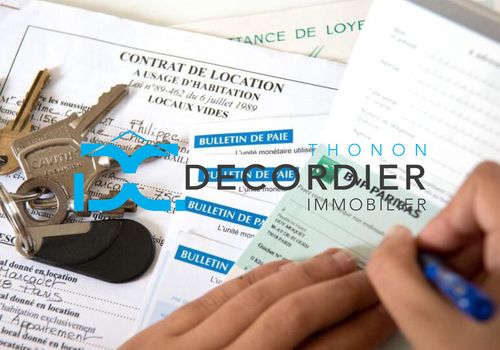
A security key for the owner and the tenant
The role of the guarantor in a rental: A security key for the owner and the tenant
In the context of a real estate rental, whether for an apartment or a house, the guarantor plays an essential role, both for the owner and the tenant. Although the term "guarantor" is frequently used, it sometimes remains vague for those who are not used to rental contracts. In this article, DECORDIER immobilier Thonon clarifies for you the role of the guarantor, their responsibilities, and the conditions under which they intervene.
1. Definition of the guarantor
The guarantor is a natural or legal person (such as a company) who acts as surety for the tenant in the context of the rental of a property. In the event of default by the tenant, the guarantor agrees to pay, in whole or in part, the unpaid rent or to cover certain costs related to the rental, such as rental repairs or unpaid charges.
The guarantor is therefore a way for the owner to protect himself against the risk of non-payment, but he is not involved in the day-to-day management of the rental contract.
2. Why is a guarantor necessary?
The role of the guarantor becomes very important in situations where the tenant has a profile that the owner considers risky. For example, a tenant with insufficient income, an unstable financial situation or a history of unpaid rent may not reassure a landlord. In this case, the presence of a guarantor allows the landlord to be assured that payments will be made, even if the tenant defaults.
For the tenant, using a guarantor can also be a way to facilitate the acceptance of his application, particularly if his income does not correspond to the criteria required by the landlord (often a salary equivalent to 3 times the amount of the rent).
3. The guarantor's responsibilities
The guarantor has several legal obligations, which vary depending on the nature of the commitment (joint and several or simple surety):
Joint and several sureties: In this case, the guarantor agrees to pay the tenant's debts in the event of default, without any precondition. If the tenant does not pay the rent, the owner can directly ask the guarantor to pay the amounts due. The guarantor therefore becomes jointly and severally liable for the rental obligation. This is the most common form of surety.
Simple surety: If the commitment is simple, the owner must first attempt to recover the amounts due from the tenant before turning to the guarantor. In this case, the guarantor's liability is only incurred if all steps have been taken with the tenant.
In the event that the surety is implemented (when the tenant does not pay), the guarantor must therefore pay the amounts due, which he may, in certain cases, recover later from the tenant.
4. The conditions of the guarantor's commitment
There are several criteria that a landlord can impose before accepting a guarantor:
- Financial capacity of the guarantor: The guarantor must generally prove sufficient resources to cover any unpaid rent. In France, the landlord can ask for documents such as the last three pay slips, tax notices, or even proof of assets.
- The relationship between the tenant and the guarantor: Although the guarantor does not have to be a family member, it is often preferred that the person chosen be a trusted person. Some rental practices require the guarantor to be resident in France to facilitate procedures in the event of a dispute.
- The type of contract: The guarantor can be asked to cover part of the rent or all of it, depending on the amount of the rent and the landlord's requirements. It may also be necessary to sign a separate surety contract in addition to the rental agreement.
5. The limits of the guarantor's role
It is important to note that the guarantor's role has limits. Indeed:
The guarantor cannot be held responsible for willful damage caused by the tenant, nor for unpaid amounts after the end of the lease or in the event of termination of the contract by the tenant.
A guarantor cannot replace the tenant in managing the rental. He has no management rights over the property nor participation in signing the lease (unless he is a co-tenant).
Furthermore, in France, a guarantor can request that his deposit be limited in time (for example, by specifying that he only guarantees the first 12 months of rental).
6. The case of public guarantee schemes
To provide greater security for landlords while easing the pressure on tenants, public schemes have been set up, such as Visale (public rental deposit manager) in France. This system makes it possible to replace a private guarantor in the event of non-payment, with the assurance that the State or a third-party organization will cover unpaid rent under certain conditions.
7. Conclusion: A Key Partner for the Owner and the Tenant
The guarantor is therefore a key player in property rental. For the owner, it represents security against financial risks, while for the tenant, it makes it possible to relax the landlord's requirements and facilitate access to housing. However, it is important that the role and responsibilities of the guarantor are clearly defined from the start of the rental to avoid any ambiguity.
Landlords must ensure that they comply with the rules on guarantees and ensure that the guarantor is able to meet their commitments. For his part, the guarantor must clearly understand the extent of his obligation before committing. Good communication and clear contracts are essential for the relationship between tenant, guarantor and owner to be smooth and conflict-free.
DECORDIER immobilier agencies can help you with your real estate project:
- Thonon +33 (0) 4 50 72 31 95 / e-mail : thonon@decordier-immobilier.com
- Evian +33 (0) 4 50 75 15 15 / e-mail : evian@decordier-immobilier.com
- Grand-Baie : +230 268 2828 / e-mail : contact@decordier-immobilier.mu
www.decordier-immobilier.com
